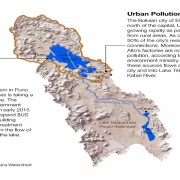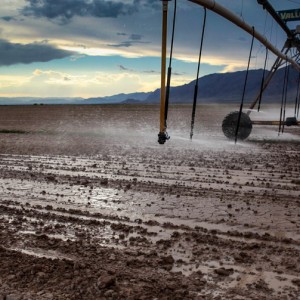Q&A: SustainAbility Survey Reveals Clean Water Shortages As Most Urgent Issue
For 15 years SustainAbility and GlobeScan have polled global thought leaders about the planet’s greatest sustainability challenges. The collaborating firms also release three “pulse” surveys based on three critical sustainability issues that most concern companies and their shareholders.
| For full coverage of public, business and expert opinion on water issues globally, including a list of the top 20 solutions, see Circle of Blue WaterViews water opinion project here.
In 2009, the international poll determined that clean water shortages top the world’s most urgent issues. Experts surveyed believe that water challenges will have a “profound effect” across all sectors of society. For Circle of Blue Radio, J. Carl Ganter spoke with two of the report’s authors about water’s brightening spotlight and how this attention could translate into tangible reforms in the business world and beyond.
J. Carl Ganter: Welcome to Circle of Blue Radio’s Series 5 in 15 where we’re asking global thought leaders 5 questions in 15 minutes, more or less. These are experts working in journalism, science, communication design, and water. I’m J. Carl Ganter. Today’s program is underwritten by Traverse Internet Law, tech savvy lawyers, representing internet and technology companies.
The SustainAbility Survey conducted each year by GlobeScan takes the pulse of the planet’s sustainability experts. What are the biggest trends emerging in business? The greatest threats? Public policy changes? It’s one window into the future of business and sustainability. Today we’re talking with two leaders of the SustainAbility Survey on water. Jeff Erikson is Senior Vice President at SustainAbility, the London based consultancy, and Chris Coulter is Vice President for Global Insights and Strategy at GlobeScan. Jeff, give us an overview of the survey. Where this really started, and give us a sense of what’s happening out there.
Jeff Erikson, SustainAbility: Actually this story goes back about 23 years when both SustainAbility and GlobeScan were separately founded, and we’ve tracked each other through those 23 years in the progression, both of the company’s growth and the sustainable development movement. In a sense, we are kind of natural partners for each other. About a year and a half ago, we decided to take the relationship we had and kind of build on that and create a joint program called the Sustainability Survey Research Program. So it combines Globescan’s strengths in its information analytics and surveying and the great resources they have in polling with SustainAbility’s traditional focus on corporate strategy in both insights and foresights. A really nice combination of strengths that both organizations brought, and we pulled this program together. It’s a membership program, and we conduct polling typically three times a year on various elements of the sustainable development agenda. It’s a membership program, so the full results are shared with the members that contribute and actually fund the polling, and then there’s a set of summary results that we provide back to those experts and practitioners that provide us the information. I think that’s one thing that differentiates this program from any others is that first we’re polling experts, the folks that have been in the business, that work in sustainable development of one form or another. It’s a fairly large sample size as well, somewhere in the neighborhood of 3,000 respondents for each of the surveys that we’ve had. It’s different than the public opinion and different than maybe a smaller polling pool of experts. It’s pretty substantial and crosses more than 80 countries.
Chris Coulter: There’s also multi-stakeholder and orientation, so we’re polling NGO leaders beside corporate leaders beside government leaders beside academic.
J. Carl Ganter: Thanks, Chris. Okay. So we’ve got the background, expert opinion, informed prognosticators. Let’s get to the meat of this year’s survey, which tracked some pretty interesting opinions about water from water scarcity to water pollution. Jeff, fill us in.
Jeff Erikson: Last year the first survey that we conducted, one of the first questions that we asked our experts is what is urgency of these various sustainable development issues? On top of the list, in the sense of what experts thought were the most urgent challenges we faced, was clean water shortages. That [placed] even above climate change, which to some degree surprised us. I think the reason for that is because the first and probably most severe impact of climate change will be on water supplies. That kind of makes sense in hindsight. Clean water shortages came out at the top, so it was just a natural for us to focus one of our next surveys on the issue of water. Of course, that tracks well with the amount of both prominence and the urgency that the issue is having in the corporate sector, among governments, among NGOs and among communities, cities, and villages across the globe.
J. Carl Ganter: Chris, could you add to that a little bit more about the context of the expert panels and their opinions on water.
Chris Coulter: The expert panel is relatively new. It’s always been in context of other issues, but we’ve never designated this much real estate on a survey for water, and it’s reflective of the growing urgency. What’s interesting is there’s a parallel piece of research that we have been doing around tracking public concerns around water across the world as part of a global public opinion research, and in parallel, at the same time, this level of urgency that people are feeling on the ground has also grown and increased.
This level of urgency that people are feeling on the ground has also grown and increased.
— Chris Coulter, GlobeScan
The nice twinning of two research programs, one the expert side and then [the other] broad consumer public opinion side. Both of these research platforms are suggesting that this is a very urgent issue and highly relevant, which differs a little bit from climate change. Where climate experts have been very concerned and focused on climate change for many years now and are tracking [it], but the public, while there’s growing concern around it, [climate change] still is a tier two environmental issue, where water is at the very top of environmental concern among the general public.
J. Carl Ganter: So Chris, what are some of the key trends you’ve spotted here?
Chris Coulter: We know that experts have increasingly pointed to water as an urgent issue, and this was the big finding that Jeff referred to earlier. It’s on the agenda and quite high. Equal level of urgency is climate change, which for us was a bit surprising, given the lead up to Copenhagen last year. It was also different qualitatively from how experts perceive climate change when it comes to the corporate sector. Experts really were saying that companies were relatively effective in addressing their own greenhouse gas emissions, but not feeling that same level of optimism when it came to corporate impacts on their water footprinting.
…(water) is a more challenging issue for corporations to get their heads around.
This suggests that it’s a more challenging issue for corporations to get their heads around. It could be just because these are early days for companies in managing water footprinting overall, or it could point to the fact that water is just a different beast — perhaps more political in nature and more challenging and far reaching. From a stakeholder perspective, it touches everyone a little more directly than climate change does in the short term. It suggests that it needs special attention.
J. Carl Ganter: So Jeff, take us on a tour of the top line findings here?
Jeff Erikson: You know, I think one of the most compelling findings and a bit surprising that I saw in the survey was that the experts believe that there’s not just a couple of sectors across the economy that will be impacted. One of the questions that we asked was how urgent is it to meet the change across these numerous sectors? We identified about dozen [sectors], and a majority of the respondents said that there was a significant and urgent need to change.
The water issue is not an issue that’s just going to impact food and agriculture or the beverage industry. It’s going to have far reaching affects across numerous industries, and experts expect actual transformation required across many of these industries over the next decade. It will have a profound affect.
— Jeff Erikson, SustainAbility
The water issue is not an issue that’s just going to impact food and agriculture or the beverage industry. It’s going to have far reaching affects across numerous industries, and experts expect actual transformation required across many of these industries over the next decade. It will have a profound affect. We’ve seen that this expert poll, particularly in the historic work that GlobeScan has done, has been a pretty strong predictor of outcomes. They’ve had a pretty good history of identifying issues early. Expect water to have dramatic impact across many sectors over the next decade or so. That was probably the strongest, the most compelling finding in the survey for me.
Chris Coulter: And to just get specific on that, Jeff, that’s totally the case, and 92 percent of experts, for example, said that the food and agriculture industry will need to transform because of the impact of water scarcity on their business. Eighty-nine say pulp and paper, beverages is 82, and mining is 80 percent — so all of these sectors have almost unanimous expression from these experts that this issue is a fundamental agenda for their business success in the medium and long term. If we compare the amount of activity that climate change has had within the sustainability strategies of these companies, and our experience is that water is much lower on that agenda and is suggestive of really significant increase in thinking how they approach water, resource internally to get with the right technical expertise to manage water strategies. This is an issue that in the next five years will be pre-occupying for many folks within companies.
J. Carl Ganter: Thanks, Chris. So Jeff, what are people saying about solutions?
Jeff Erikson: One of the other strong results that I found, too, was the need for a multifaceted approach to managing freshwater supplies.
Much like climate change, there is no silver bullet. And conservation—the efficient use of water—was rated most highly as an approach to take to manage water sustainably, but there were, again, numerous elements of this. It’s not just about conservation and efficiency. Public policy is an important element here. Education and awareness is an important element here as well.
— Jeff Erikson, SustainAbility
Much like climate change, there is no silver bullet. And conservation—the efficient use of water—was rated most highly as an approach to take to manage water sustainably, but there were, again, numerous elements of this. It’s not just about conservation and efficiency. Public policy is an important element here. Education and awareness is an important element here as well. When companies are identifying or defining their water strategies, they need to look not just at their own operations and minimizing their consumption but what’s beyond their fence line to the watershed and then to the public policy element and then to the general population as far as education and outreach goes. It goes well beyond individual facilities’ fence lines as a requirement to manage our water supplies.
J. Carl Ganter: So Chris, how’s this tied to this long list of technology approaches to climate?
Chris Coulter: That was very surprising that we say, again compared to climate change, water solutions were much less focused on technology. We saw renewables in the climate change agenda, and the advice to companies is to focus on a shifting energy policy and getting it to renewables and leveraging technology where appropriate. For water, as Jeff noted, it seemed a lot softer. The software required to manage this has a lot to do with outreach, education, policy engagement, which is really interesting. And that’s probably why experts were saying that companies will be a little less effective on this than climate change because of the necessity of stakeholder relationships and collaborations to address the issue.
Jeff Erikson: You know, we keep talking about climate change, and there’s a lot of parallels here, and I’m going to bring out another one. One of the survey questions was about the importance of water footprinting compared to the importance of carbon footprinting. What we found again was that the strong majority of experts said that water footprinting was at least as important as carbon footprinting, if not more important. You know, the challenge here is that carbon is carbon and has the same impact, regardless of where it’s generated. With water, it’s very location dependent, so there’s that additional level of complexity in defining what your water footprint is. It’s not just about how much you consume. You have to layer on top of that the impact to your local environment. A bit of complexity, but again a recognition that if companies are not on top of this now, they need to get on top, because that’s what all of their stakeholders, including their shareholders, are going to require in the very near future.
…a recognition that if companies are not on top of this now, they need to get on top, because that’s what all of their stakeholders, including their shareholders, are going to require in the very near future.
— Jeff Erikson, SustainAbility
J. Carl Ganter: So we have a barometer of sorts, a window into the future. How is this, the world water crisis, water scarcity, water pollution, how is this tracking compared to other issues you monitor?
Jeff Erikson: Well, I think it’s tracked more quickly than other issues. I think one of the reasons for it is that, again the climate change agenda has absorbed the sustainability community so deeply over the last decade. All of the work that was set in place to try and have organizations address or interact with the climate agenda has been plowed forward. It’s easier for other issues that are as comprehensive, like water, to fall into that sort of that wake of how the big climate change vote is pushed through the waters. I think we’ll see an acceleration of this in the next big issue, diversity, on the heels and an interconnect between climate change and water makes it easier for uptake across the board.
J. Carl Ganter: So Jeff, are there any other issues that you can make comparisons as far as the growth, as far as the tracking here?
Jeff Erikson: Yeah, Carl, and I’m thinking about another issue, a different issue, that’s grown rapidly in both awareness and corporate response what was perceived originally as a public policy issue. I think about obesity and nutrition. Very quickly, I would say over a span of less than five years, food companies and the fast food industry in particular went from a position of this is not my problem, [that] this a public government problem, the obesity issue, to one where they’ve decided that they can have an impact and, in fact, should have an impact. I think a parallel tracking they would want if from this is a public resource. And what we do is very important and we just need to worry about what’s happening internally to what is the impact we’re having on our stakeholders and those that share this resource with us.
There’s a liability issue there as well, a license to operate if you will.
— Jeff Erikson, SustainAbility
There’s a liability issue there as well, a license to operate if you will. If the food companies have seen, [and] continue to see, as well as a legal issue. You know Coca-Cola’s run into legal challenges and actually literally lost their license to operate one of their plants in India because of the water shortages. They see this as a way not to just to protect their reputation, but also to ensure that their going to continue to be able to put out the product that their customers are buying.
J. Carl Ganter: I think some people are going to find the responses surprising regarding the solutions. They are not necessarily seeing the large scale projects, even desalination, as popular solutions. Jeff?
Jeff Erikson: Well, first one of the findings that we saw was that when we asked experts what are the important components of sustainable water management, there was a focus on reducing demand over increasing supply. There is a bit of a geographic shift. Developing countries had more interest in increasing supply than developed countries. There was still the preponderance of the responses that there was more of a focus on reducing demand as a preference. And that kind of makes sense from a sustainable development standpoint. That leaning is pretty consistent with what we’ve seen elsewhere.
The experts were really lukewarm on constructing desalination plants.
The experts were really lukewarm on constructing desalination plants. Of course, I think the reason for that is because they’re so energy intensive. Consequently, they’re greenhouse gas intensive. A couple of experts in one of the open ended questions that we asked suggested low or no carbon desal plants as a way to ensure a sustainable supply of water, but there’s this recognition that there’s a trade-off. We’re seeing that as well, not just with desalination plants, but also with things like thermal solar, a big user of water, and their often located or intend to be located in areas where there’s water scarcity. This recognition that there’s often trade-offs and that there needs to be consideration of energy and climate change issues in the water policy and consideration of water in energy climate change policy.
J. Carl Ganter: Chris, tell us more about the responses to the open ended questions, those questions where people have a chance to really express themselves.
Chris Coulter: I think on which companies are leading in water right is interesting, and this is an important part of what we’re trying to track in describing and understanding leadership in sustainability, specifically corporate leadership.
What was interesting is that there’s a significant proportion of experts who can’t name a leader in water management, which suggests these are early days relatively compared to other issues.
— Chris Coulter, GlobeScan
What was interesting is that there’s a significant proportion of experts who can’t name a leader in water management, which suggests these are early days relatively compared to other issues. Among those who are mentioned, Coca-Cola by far and away is the top. Nestle, GE, Pepsico, ICB Miller, Unilever, these are mentioned by experts as leaders but also to relatively small degrees apart from Coca-Cola. We see out of that list a whole bunch of the food and agriculture and beverage business. GE isn’t, but everyone else is, so it’s been predominantly focused on that industry thus far, but from the research, it shows that other industries are under the spotlight and expect dramatic shifts and changes. We mentioned mining, but also oil and gas is on there and forestry, as well as a few other sectors. This is a transforming agenda, and we’ll be watching this closely to see what kind of companies are increasingly getting recognition from the sustainability community on this important issue.
Jeff Erikson: And as a follow-up to that question, we asked another open ended questions, “Why do you think that company that they identified is a leader in addressing water availability and water quality?” And as you look through the responses, nearly a third of the responses indicated that they perceive this as a leader because they’ve included water issues as a part of their core business strategy. Just behind that was a recognition that water through the supply chain, so for life cycle impacts. Life cycle water footprinting was an important part. They looked not just at their own manufacturing process, but went upstream into the supply chain. Another was a leader in technology and innovation. Those were the top three groups of responses from one of the open ended questions about leadership. In talking about technology and innovation, which leads to another open ended question we had, which was “What are some of the solutions?” What I expected actually to see was some whiz bang new technology approaches to either reducing demand or increasing supply. What one found out instead was just good old fashion blocking and tackling, taking the basics, the importance of energy conservation, the importance of education and awareness, using things like low-flow valves, things that already exist. It’s the low tech drip irrigation. That was a bit of a surprise for me that there’s a recognition that the solutions to a sustainable water supply already exist. It’s just a matter of implementing them more effectively.
…there’s a recognition that the solutions to a sustainable water supply already exist. It’s just a matter of implementing them more effectively.
— Jeff Erikson, SustainAbility
J. Carl Ganter: So Chris, why don’t you tell us more about the linkages between water and energy and where does water policy fit in all this?
Chris Coulter: It was remarkable, as Jeff told you earlier, that the people pointed to water footprinting as or more important than carbon footprinting. A very high majority believe that. We asked a second question around intersections between energy policy and water policy, and we gave experts options. These two issues are very distinct, and they should be managed quite separately. There are some linkages, but they’re mostly distinct and should be managed separately. About 24% of experts weigh in on these things. These are different issues; they should be completely separate and managed in silos essentially. But 54 percent think that there’s all kinds of linkages here and they should be integrated as joint policies between energy and water policies. Another 21 percent said these issues are inextricably linked and there should be a single integrated approach. This has all kinds of interesting implications for companies. These two issues, which I think are managed from an issues management perspective in companies, are quite separate. One of a bunch of things they’re doing is to suggest these things have to be linked up and joined. Again, it’s not just the food and beverage industry that’s affected. This is across a whole range of sectors that this is relevant for.
J. Carl Ganter: How does this affect the strategies in approaching these interconnecting issues, water, energy and the environment? Jeff, maybe you can take that one.
Jeff Erikson: Sure. With respect to strategy, I think it’s an enormous mistake to silo these. In fact, in any sustainable development strategy, there’s so many interconnections between the sustainability issues, not environmental issues, but also social issues. You certainly need to look at it holistically. You look at across structures, across functions, particularly with respect to water and energy. One of the most effective ways to reduce your energy consumption and consequently reduce your costs of energy is to move less water around. I think it’s in the state of California, somewhere near 25 percent of the energy consumption in the state is to actually move water, whether that’s irrigation, piping from north to south or east to west. That’s a great way to begin to address some of your energy reduction is to start looking at how effectively you’re moving water around or consuming water.
There’s most certainly a direct business benefit to having that integrated approach to water and energy.
— Jeff Erikson, SustainAbility
There’s most certainly a direct business benefit to having that integrated approach to water and energy. Then the other element of that is, if you’re looking at things from an operational standpoint and a risk standpoint, you need to ensure that you are considering both the public policy and the physical implications of things like climate change when you’re sighting a facility. Climate change is going to result in more severe weather patterns, but also significant changes in water supply. Just a couple of places where those two elements need to be pretty fully integrated into corporate strategies.
J. Carl Ganter: Companies that subscribe to the survey have been seeing these issues emerge on their radar for a while now, interconnections and whatnot. What’s the response to these results in this survey?
Chris Coulter: I think in many cases it’s not news that water’s important, but I think the sense of prioritization of water is one of the key issues defined in the Sustainability Agenda in the short term was revealing and important and spurred this more deep dive into this issue with the expert community. I think the results, particularly comparing it to climate and the energy policy, were really revealing and important, and I think it gave people who had that intuition that that is the direction they should be going, that additional benefit concept that this is how they should be shifting and shaping their sustainability strategy. We expect that to be visible across the corporate sector in the coming year.
Jeff Erikson: I would add to that. I think that with all the surveys that we have under our program, we’re not expecting all the results to be a shock to people or a new issue to people. Some of the results will provide supportive data for either issues or directions that’s trying to push through their organization and will provide them with a bit more ammunition on getting those through. It’s actually data that they can take to senior leadership and provide more of a business case for what it is they want to do. Then there are some elements of surprising insights that are going to show up, and every company is going to find something different and unique for them in the survey that’s going to help them take their sustainability efforts forward and their water management issues forward. I can’t say that there’s a single finding that’s going to be most relevant to everyone of our member companies, but there’s plenty in there that folks can grab ahold of and identify those that are going to support their advancement of the water agenda internally, and externally for that matter, most effectively.
J. Carl Ganter: Chris, what about the regions where you did your polling? Were there different responses for different parts of the world?
Chris Coulter: Broadly, people in water stressed areas have greater urgency around the issue, so that includes always the developing countries, but Australians in our sample are sort of living through this with drought and wildfires, etc., lately. They take the issue much more seriously and more focused. As a result, especially in some developing countries, some solutions that are deemed less sustainable, like desalination plants, are viewed as more viable and important to jump into. There’s that sense of looking at the future from those areas that are already water stressed on the tradeoffs that people are willing to make, even against energy policy, which the experts believe is an integrated approach. That’s a challenging piece for all of us to get around.
J. Carl Ganter: So the big question at the end of the day is what’s this mean for sustainability in the broadest sense and impact even? Chris?
Chris Coulter: There’re two pieces to why we are doing this. One is to make a contribution to the sustainability debate overall, and we’ve got this wonderful expert panel of thousands of people who are really committed to this agenda and have a long time experience. And that’s one audience. Included in that are government officials who are committed to or have experience in sustainability, and so they’re responding and also the getting feedback loops. We don’t know exactly where that goes in their world, but the other audience that we’re really focused on are our clients, which are our corporate members. Their interaction with government on water is substantial and critical. Their engagements and their work, I think, we encourage them to share these results with their stakeholders, if it’s NGOs, community leaders, or governments, and having this data to say, “Hey, here. Government is on the radar and a critical piece of this puzzle. We’re in this together.” That’s one that we would encourage and we hope is useful to quantify some of the intuitions and inklings that our clients have. On the public piece, what was remarkable was, of course, on an issue like water or any environmental issue, the general public certainly defaults to government as being a key actor.
What was surprising was the legitimacy that the public bestowed on corporations to get involved on water management issues.
— Chris Coulter, GlobeScan
What was surprising was the legitimacy that the public bestowed on corporations to get involved on water management issues. That was interesting, given some of the challenges around privatization of water, especially in developing countries, that there’s a legitimate role that companies can play and an obligation and a responsibility the company needs to play on helping manage this. Not exclusively, but together with other actors in society. That was load and clear from the public opinion research we did.
J. Carl Ganter: So Jeff, how does this play into policy and change over the long term?
Jeff Erikson: Purely on a lifecycle issue, grassroots activists, and then moving from there into more prominent NGOs and advocates, and then through the media and then public opinion. Actually, politicians and regulators are very late in the life cycle of an issue.
By the time things are in public policy and in regulation, the opportunity in some ways has already passed companies by, that opportunity for early action and for first mover status has already gone.
— Jeff Erikson, SustainAbility
By the time things are in public policy and in regulation, the opportunity in some ways has already passed companies by, that opportunity for early action and for first mover status has already gone. Governments are very important in the imbedding phase of an issue, like water. One of the values in a poll like this is that we are looking at thought leaders, opinion leaders, those who are thinking further out ahead than, in many times, in many cases, the general public and the government. We think that this will enable many corporations to use some of this information in the way that they engage with governments, either in partnerships or in through advocacy and lobbying or whatever to push action on this maybe more quickly than what would happen otherwise.
J. Carl Ganter: Thank you both for joining us today. We’ve been speaking with Jeff Erikson, Vice President of SustainAbility, the London based consultancy that produces the SustainAbility Survey, and also with Chris Coulter, Vice President of GlobeScan, the international polling firm. To learn more about global opinion on water issues and the stories behind them, be sure to tune in to Circle of Blue online at 99.198.125.162/~circl731.
Our theme is composed by Nadav Kahn, and Circle of Blue Radio is underwritten by Traverse Legal, PLC, internet attorneys specializing in trademark infringement litigation, copyright infringement litigation, patent litigation and patent prosecution. Join us again for Circle of Blue Radio’s 5 in 15. I’m J. Carl Ganter.
Circle of Blue provides relevant, reliable, and actionable on-the-ground information about the world’s resource crises.














Why can’t we catch condensation on a large scale? Like water towers? Funneled domes over tanks?